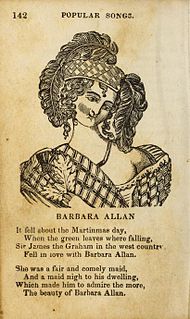Related Research Articles

"Barbara Allen" is a traditional folk song that is popular throughout the English-speaking world and beyond. It tells of how the eponymous character denies a dying man's love, then dies of grief soon after his untimely death.
"Lily of the West" is a traditional British and Irish folk song, best known today as an American folk song, listed as number 957 in the Roud Folk Song Index. The American version is about a man who travels to Louisville and falls in love with a woman named Mary, Flora or Molly, the eponymous Lily of the West. He catches Mary being unfaithful to him, and, in a fit of rage, stabs the man she is with, and is subsequently imprisoned. In spite of this, he finds himself still in love with her. In the original version, the Lily testifies in his defense and he is freed, though they do not resume their relationship.
The lyrics to the song The Mountains of Mourne were written by Irish musician Percy French (1854–1920), the music was composed by Houston Collisson (1865–1920). Another theory is that it is based on the traditional Irish folk tune "Carrigdonn" or "Carrigdhoun". The latter was the same tune used by Thomas Moore (1779–1852) for his song Bendemeer's Stream.
"Banks of the Ohio", also known as "Down on the Banks of the Ohio" and "I'll Never Be Yours", is a 19th-century murder ballad, written by unknown authors. The lyrics tell of "Willie" who invites his young lover for a walk during which she rejects his marriage proposal, and once they are alone on the river bank, he murders the young woman.

"The Raggle Taggle Gypsy", is a traditional folk song that originated as a Scottish border ballad, and has been popular throughout Britain, Ireland and North America. It concerns a rich lady who runs off to join the gypsies. Common alternative names are "Gypsy Davy", "The Raggle Taggle Gypsies O", "The Gypsy Laddie(s)", "Black Jack David" and "Seven Yellow Gypsies".

Caroline Lavelle is an English singer-songwriter and cellist who has created three solo albums and contributed vocals, music, and production help to many other artists and bands.
The Bonnie Lass o' Fyvie is a Scottish folk song about a thwarted romance between a soldier and a girl. Like many folk songs, the authorship is unattributed, there is no strict version of the lyrics, and it is often referred to by its opening line "There once was a troop o' Irish dragoons". The song is also known by a variety of other names, the most common of them being "Peggy-O", "Fennario", and "The Maid of Fife".
"The Twa Sisters" is a traditional murder ballad, dating at least as far back as the mid seventeenth century. The song recounts the tale of a girl drowned by her jealous sister. At least 21 English variants exist under several names, including "Minnorie" or "Binnorie", "The Cruel Sister", "The Wind and Rain", "Dreadful Wind and Rain", "Two Sisters", "The Bonny Swans" and the "Bonnie Bows of London". The ballad was collected by renowned folklorist Francis J. Child as Child Ballad 10 and is also listed in the Roud Folk Song Index. Whilst the song is thought to originate somewhere around England or Scotland, extremely similar songs have been found throughout Europe, particularly in Scandinavia.
"Down by the Salley Gardens" is a poem by William Butler Yeats published in The Wanderings of Oisin and Other Poems in 1889.
"I'll Tell Me Ma" is a well-known children's song. It was collected in various parts of England in the 19th century and again appears in collections from shortly after the turn of the 20th century. In Ireland the chorus usually refers to Belfast city and is known colloquially as "The Belle of Belfast City", although it is also adapted to other Irish cities, such as Dublin. English versions refer to the "Golden City" or "London City". This song is Roud Folk Song Index number 2649.
"The Trees They Grow So High" is a British folk song. The song is known by many titles, including "The Trees They Do Grow High", "Daily Growing", "Long A-Growing" and "Lady Mary Ann".
The Suffolk Miracle is Child ballad 272 and is listed as #246 in the Roud Folk Song Index. Versions of the ballad have been collected from traditional singers in England, Ireland and North America. The song is also known as "The Holland Handkerchief" and sometimes as "The Lover's Ghost".
Dives and Lazarus is traditional English folk song listed as Child ballad 56 and number 477 in the Roud Folk Song Index. It is considered a Christmas carol and based on the parable of the rich man and Lazarus. The song traditionally used a variety of tunes, but one particular tune, published by Lucy Broadwood in 1893 and used in other traditional songs, inspired many notable works and appeared in several pieces composed by Ralph Vaughan Williams.
"The Cuckoo" is a traditional English folk song, also sung in the United States, Canada, Scotland and Ireland. The song is known by many names, including "The Coo-Coo", "The Coo-Coo Bird", "The Cuckoo Bird", "The Cuckoo Is a Pretty Bird", "The Evening Meeting", "The Unconstant Lover", "Bunclody" and "Going to Georgia". Lyrics usually include the line : "The cuckoo is a pretty bird, she sings as she flies; she brings us glad tidings, and she tells us no lies."

"The Butcher’s Boy" or "The Butcher Boy" is an American folk song derived from traditional English ballads. Folklorists of the early 20th century considered it to be a conglomeration of several English broadside ballads, tracing its stanzas to "Sheffield Park", "The Squire's Daughter", "A Brisk Young Soldier", "A Brisk Young Sailor" and "Sweet William " and "Died for Love".
"Down in the Willow Garden", also known as "Rose Connelly" is a traditional Appalachian murder ballad about a man facing the gallows for the murder of his lover: he gave her poisoned wine, stabbed her, and threw her in a river. It originated in the 19th century, probably in Ireland, before becoming established in the United States. The lyrics greatly vary among earlier versions, but professional recordings have stabilized the song in a cut-down form. First professionally recorded in 1927, it was made popular by Charlie Monroe's 1947 version, and it has been recorded dozens of times since then.
"One Morning in May" is an English folk song which has been collected from traditional singers in England and the USA and has also been recorded by revival singers. Through the use of double-entendre, at least in the English versions, it tells of an encounter between a grenadier and a lady.
Transportation ballads are a genre of broadside ballad some of which became an important part of the folk song traditions of Britain and Ireland. They concern the transportation of convicted criminals firstly to the American colonies and then to penal colonies in Australia. Transportation ballads were published as broadsides,. Many have passed into the folk tradition and have been collected subsequently from traditional singers.
High Germany, is a traditional folk song, once known throughout England, Ireland and Scotland, with a history spanning hundreds of years. There are three songs known as High Germany. This page focuses on the best known one, the others being The Two Lovers or True Lovers and The Wars of Germany.
References
- ↑ www.sinclairgenealogy.info http://www.sinclairgenealogy.info/moorlough-shore . Retrieved 25 March 2013.
{{cite web}}: Missing or empty|title=(help)